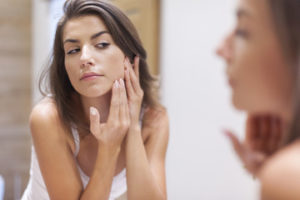Does Sun Exposure Help Acne?

Chances are you’ve waged war against acne at different times of your life. Although popular wisdom says that acne is only a problem for teenagers, that’s just not the case. Adults also get pimples and sometimes struggle with constant breakouts. While most acne sufferers have tried myriad remedies, using the sun to combat breakouts is not the best way to treat your breakouts. Read on to learn why sun exposure to treat acne is only a temporary solution and how adopting a better skin care routine can help reduce breakouts.
Can the Sun Help with my Acne?
Many people believe sun exposure dries out acne-causing oil, thereby curing breakouts. Additionally, getting a tan can temporarily camouflage the blemishes on your face. While that strategy will work in the short run, exposing your skin to too much sun will eventually backfire, causing more breakouts in the future. Here’s why:
- Flaky skin from a sunburn builds up more dead skin cells that clog pores and cause more breakouts.
- Sun exposure causes unwanted skin inflammation.
- The sun can cause dark spots and scarring to appear after pimples heal.
- Sun exposure puts you at a higher risk of skin cancer and premature skin aging.
- If you’re taking certain medications for acne, your skin can be more sensitive to UV light, making it burn faster.
- Sunbathing leads to sweating, giving bacteria a place to thrive and causing more breakouts.
So, while a little sun exposure can temporarily reduce acne, you should adopt more effective methods to keep your breakouts in check.
Effective Skin Care Routines to Reduce Acne
Acne is usually caused by hormone imbalances. When your hormones are out of balance due to causes such as puberty or pregnancy, your skin’s sebaceous glands overproduce sebum (oil). Excess sebum clogs your pores, giving bacteria a place to thrive causing pimples, and setting off a vicious cycle of breakouts. To learn the root cause of your acne, try the following tips to keep your breakouts under control.
- Wash Your Face: Wash your face at least twice a day with a mild, oil-free foaming cleanser formulated for oily skin. Don’t harshly rub your skin. Pat dry gently with a clean towel. If possible, wash your face immediately after a workout or other athletic activities. Make sure you wash away makeup before bed. Sleeping with makeup clogs pores and makes acne worse.
- Use a Toner: Lightly apply a toner or astringent to your face to remove remaining oil. Don’t overdo it – too much astringent can irritate your skin and cause it to produce even more oil.
- Moisturize: Even acne-prone skin needs a dab of moisturizer to stay in balance. Use only a gentle, oil-free moisturizer and apply sparingly.
- Apply Sunscreen: Your moisturizer might contain sunscreen, but before going outside apply a sunscreen designed for faces that contains at least SPF 30. Reapply every two hours if you’re planning to spend the day outdoors.
- Spot Treat: Experiment with different over-the-counter acne fighting products. The most popular treatments contain benzoyl peroxide and salicylic acid. Use as directed. Be patient with these products since they can take up to eight weeks to deliver results. If you don’t see any results, see a dermatologist.
Schedule Your Appointment Today
If you have acne that isn’t responding to over-the-counter treatment, make an appointment today with Keys Dermatology. Our office has offered the highest quality of dermatological services delivered with personalized attention for over 25 years.
